Benefit raises funds, First Nation awareness
November 20, 2009 by Justin Langille · Leave a Comment
You read it, hear it and speak it every day if you’re a student here, but you might not know what Kwantlen means.
The name of the university is also the name of the Kwantlen First Nation, which was the largest first nation in the Fraser Valley in the mid-19th century, according to the Kwantlen First Nation website.
In the Halq’emeylem language, spoken by the Sto:lo people, the larger band council that it belongs to, Kwantlen means Tireless Runner. That’s also the title of a scholarship given to Kwantlen First Nations students who display financial need, but also contribute to their local First Nations communities.
On Friday, Nov. 13, Kwantlen’s First Nations co-ordinators office hosted a silent auction and dinner benefit to raise scholarship funds for the  award and celebrate First Nations culture. Reporter Justin Langille was there to talk to event organizers and watch attendees bid for a variety of literature, crafts and fine art donated by supporters.
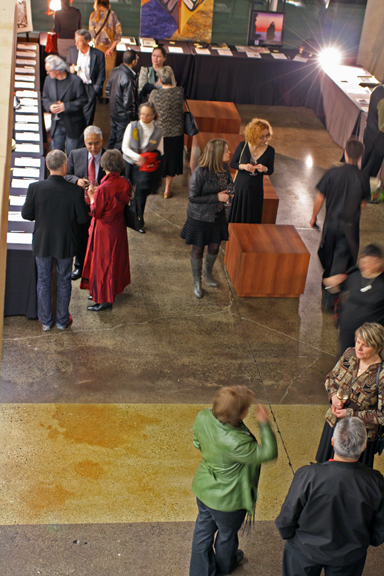
“We’re very pleased with how it turned out. I was overwhelmed with the silent auction,†said Barb Gorman, administrative assistant for educational transitions and aboriginal initiatives. Almost 100 people gathered for the event and nearly $ 5,000 was raised from bidding wars for carved masks, prints, paintings and weavings, according to Gorman.
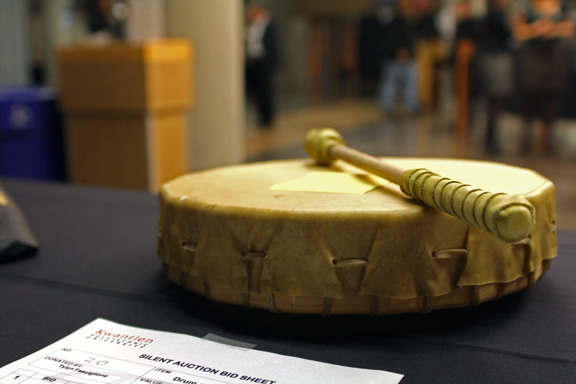
Approximately 150 students identify themselves as aboriginal at Kwantlen, but about 360 students are enrolled at all Kwantlen campuses, according to Marylin Waithman, director of educational transitions and aboriginal initiatives at Kwantlen. “Our goal is to significantly increase the number of aboriginal students who attend school here,†Waithman said.
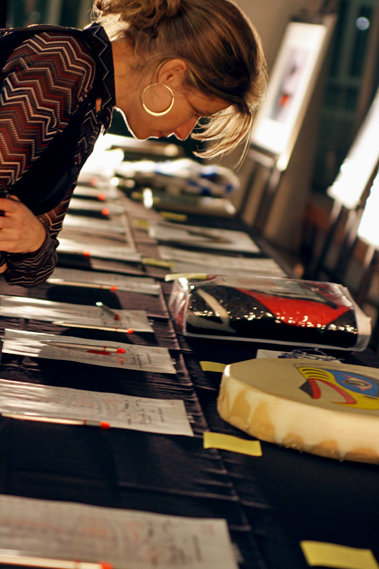
A bidder contemplates competing for a drum with a painted eagle design, donated by Emily Carr University.
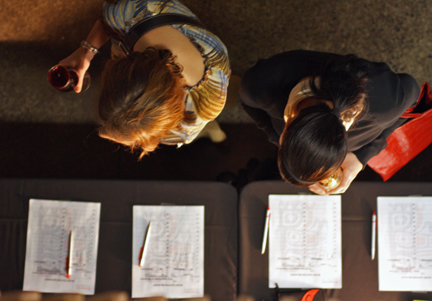
Along with the auction, patrons were treated to traditional dancing and a gourmet meal of aboriginal foods. The event was the first fundraiser for the Tireless Runner award since 2006. Every year, the award provides three $750 scholarships to aboriginal students who are in financial need and are active in First Nations communities.
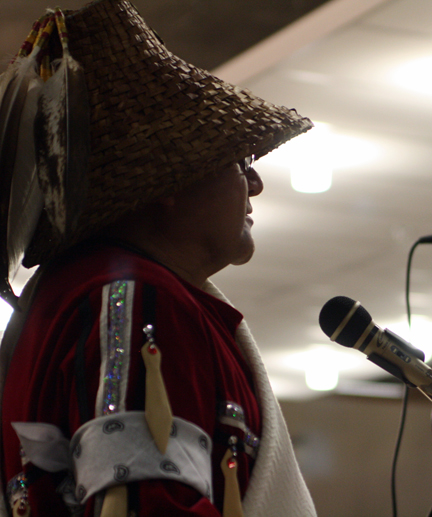
“Our people stand so proud, just for the mere fact that we have survived for so long,†Lekeyton Antone, a member of the Kwantlen First Nation, told the crowd before a dinner of smoked salmon began.“ We’re also trying to make sure that our next generations coming have a better way than we did. It’s all about people working together and it’s all about who we are and what our beliefs are.â€
Richmond KSA gives campus bathrooms a failing grade
November 13, 2009 by Justin Langille · 1 Comment

Richmond Kwantlen Student Association council director Reena Bali wants to know who hasn’t been pulling their weight in the washrooms around Kwantlen’s Richmond campus.
In Bali’s Nov.3 council report, buried beneath plans for pool tournaments and club nights, is a frank statement, condemning the conditions of most washrooms on the Richmond campus as “just horrible!â€
Many of the washrooms, especially one for women located near the Blossoming Lotus yoga studio around the corner from the KSA Richmond campus offices, is often found in an unclean state, said Bali.
She isn’t that isn’t sure about the state of washrooms for male students.
Bali said that she thinks what she says are unsanitary conditions shouldn’t be blamed on campus cleaning staff, but on inept students.
“It’s, like, the people who use it,†Bali said. “I guess they don’t know how to use a washroom properly.â€
The state of the washrooms is problem that Bali has noticed since January.
“If someone is using a washroom, they should practice proper hygiene,†said Bali. “Cleaning staff can’t come to the washroom after every 10 minutes, because they have all other things to do, too.â€
Bali feels that, other than the washrooms, Richmond is a pretty clean campus. She plans to talk to KSA chairperson Steve Lee and the university to see if she can solve the problem.
Kwantlen’s janitorial services are contracted out to Dynamic Facility Services Ltd, according to a July 22 bid aware notice written by Christine Monroe, manager of supply contracts for Kwantlen’s supply and business services division, and published on Kwantlen’s website.
Dynamic’s bid for the annual day porter and core cleaning services contract is valued at $473,024 and was accepted on the basis of a best-value criteria.
Sam Mann, facilities supervisor at Kwantlen’s Richmond campus, said that the conditions of washrooms varies from campus to campus, and that poor conditions are often due to vandalism.
“Most kids do respect the facility I believe, but it’s just that the odd person tends to (vandalize),†Mann said.
“I guess some people… could be having a bad day…could be frustrated…some people, I guess it’s just their nature to do that kind of stuff.
Warrior Boyz comes home
November 6, 2009 by Justin Langille · Leave a Comment
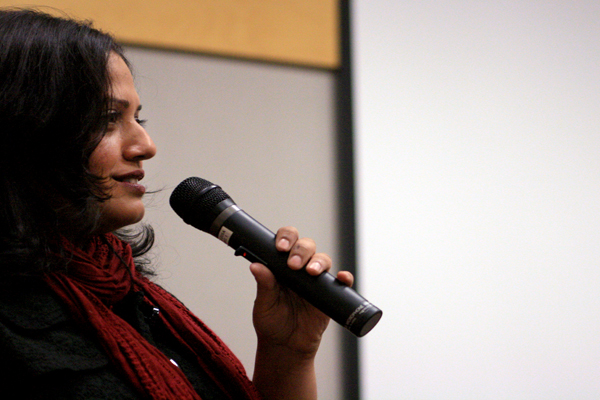
Filmmaker Baljit Sangra introduces her film Warrior Boyz to the crowd. “ We can’t deny it anymore,†Sangra said about the problem of youth gang involvement in the South Asian community. “The only way you’re going to make changes is by talking about it.†(Justin Langille photo)
It wasn’t a traditional homecoming, but the community of Surrey still welcomed it with open arms.
On Nov. 3, nearly 200 people gathered in the conference centre at Kwantlen Polytechnic University’s Surrey campus for an evening screening and panel discussion of Warrior Boyz, a documentary about the affect that gang culture has had on Metro Vancouver’s South-Asian-Canadian community.
“I’ve been wanting to do this for a long time, to show this film here in Surrey, at Kwantlen,†director Baljit Sangra proudly told the crowd. “Much of this was filmed right across the street from here at Princess Margaret [High School].â€
Moments later, the lights were dimmed and those in attendance were drawn into an intimate look at one of the Lower Mainland’s most notorious social epidemics, one that has claimed the lives of over 100 Indo-Canadian youth.
The forum, organized by faculty members of Kwantlen’s criminology department, offered students and residents of the community a chance to see Sangra’s take on the violence that has plagued the youth of Surrey.
Created in partnership with Canwest Global and the National Film Board of Canada, Sangra’s film follows the lives of Tanvir and Vicky, two young Punjabi teens who struggle to stay in school and on good terms with their family while spending their spare time embroiled in crime and gang fighting.
Through their stories, Sangra shows that alienation, unprecedented peer pressure and a desire for the status glamorized by depictions of gang life in pop culture have led many Indo-Canadian youth to chase empowerment through drug and violence-fuelled criminal lifestyles.
In an interview, Sangra said she decided to make the film when she realized that violence wasn’t letting up in Metro Vancouver’s large yet close-knit South-Asian community.
“It’s an issue that’s impacted me personally,†said Sangra. “I know people who have fallen into [gang culture] from the neighborhood; friends of friends, friends of cousins, that sort of thing. Even my parents are going to funerals of their friends who have lost a grandchild to gang violence.”
Sangra sought to understand what she saw as an overwhelming contradiction: youth from good families living in seeming suburban comfort who were becoming foot soldiers and chiefs for gangs involved in Metro Vancouver’s drug trade. With this in mind, she began talking to people in the community.
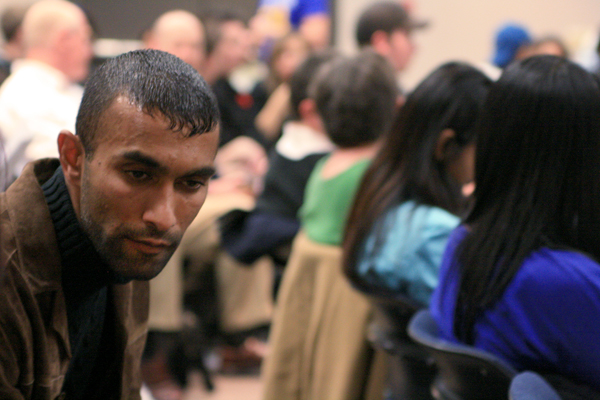
A central character in the film, Jagdeep Singh Mangat was also an important voice on the panel. Mangat challenged the audience to consider the influence that consumer culture and social alienation have on youth who enter into gang life. (Justin Langille photo)
Sangra said that building enough trust with her subjects to the point of being able to film them during vulnerable moments was the most difficult process of filming the documentary. The South-Asian community, she said, has a tendency to denial, and often prefers not to open up about sensitive social issues.
However, her persistence and dedication to the story paid off. Eventually, she gained an understanding of what was behind the headlines.
“For a lot of kids, it’s more about acceptance and belonging than money, “ said Sangra.
“I believe that all kids want to fit and also stand out in some way. And I think for some of the kids who are perhaps not the best student or athlete but come from a pretty solid family, that option of hanging out with the wrong crew or getting into trouble is pretty easy to fall into. Peer group pressure is huge.â€
Since debuting the film last spring and screening it at festivals across North America, Sangra has learned that teachers in schools and communities all across Canada have been showing it to students to show them the dangers involved in gangs as opposed to the glamour that they see on TV.
At the end of the screening, Sangra sat down with a panel of key players to discuss the factors that have led to the development of deadly gang culture in Metro Vancouver and the ways that communities can prevent youth from getting involved in the future.
The opinions of the panel members were diverse and informed by careers spent dealing with gangs from many perspectives. The panel, composed of law enforcement officials and educators, also included gang-member-turned-social-activist Jagdeep Singh Mangat, a former drug dealer and gang member who eventually left his life of crime to pursue education and community activism.
If there was one thing that the delegation agreed on, it was Mangat’s declaration that if people in Surrey and Metro Vancouver want to reduce youth gang involvement and the violence that results from it, they need to get involved in the problem.
“Don’t leave it to somebody else. You guys can seize initiative and do it yourself. Each and every single one of you can be an example to a lot of these young people. When we put our collective effort together, then it’s us that’s providing the support for people that might be falling through the cracks.â€

The panel, from Left to right: director Baljit Sangra, crown counsel Wendy Dawson, RCMP superintendent Dan Malo, Jagdeep Singh Mangat, Sociologist Indira Prahst and Sukh Rai vice principal of Frankhurt Secondary School. (Justin Langille photo)
Selections from the Panel
(Photos by Katie Lawrence, Audio by Justin Langille)
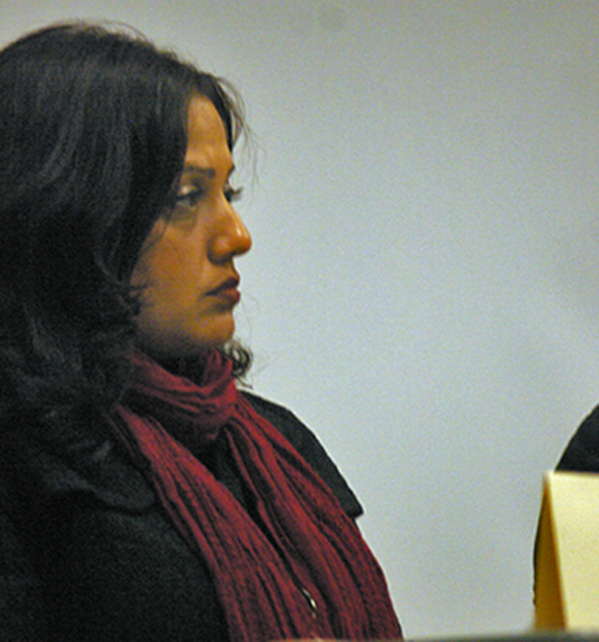
Baljit Sangra, director of Warrior BoyzÂ
[audio:http://www.kwantlenchronicle.ca/audio/sangra.mp3]
Sangra discusses her hopes for the film
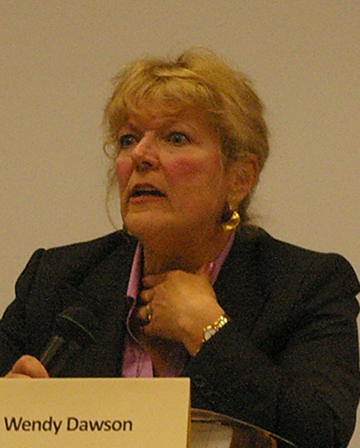
Wendy Dawson, crown counsel and leader of the Surrey Six prosecution team
[audio:http://www.kwantlenchronicle.ca/audio/dawson.mp3]
Dawson addresses the legal roadblocks that are preventing her prosecution team from moving forward in the Surrey Six trials
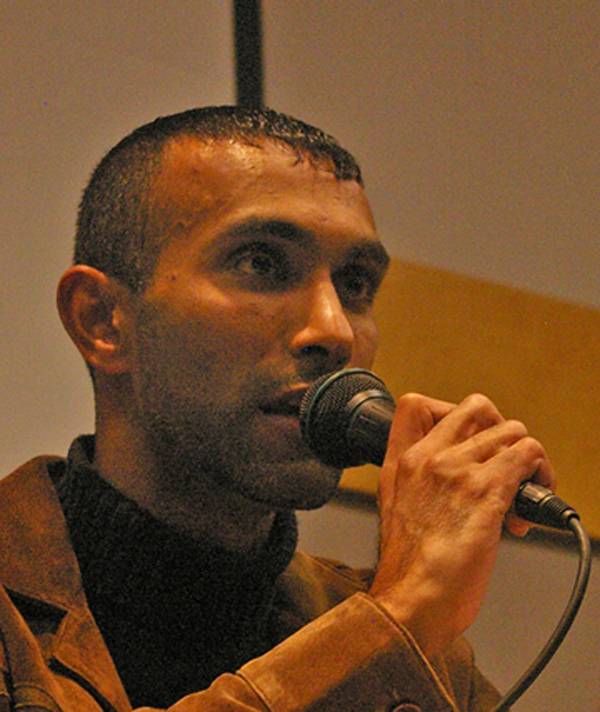
Jagdeep Singh Mangat, former gang member, UBC law student and social activist
[audio:http://www.kwantlenchronicle.ca/audio/mangat.mp3]
Mangat talks about the consumer culture roots of youth gang involvement
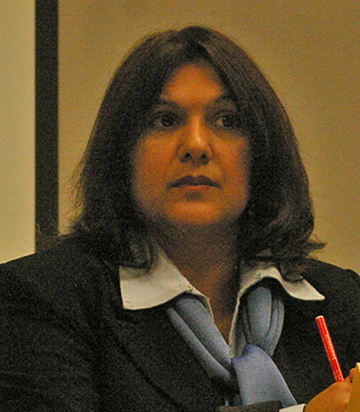
Indira Prahst, Department of Sociology, Langara College
[audio:http://www.kwantlenchronicle.ca/audio/prahst.mp3]
Prahst addresses the attractions and trapping of the gang ruled drug trade
Kwantlen instructor fights to open the end-of-life dialogue
October 7, 2009 by Justin Langille · Leave a Comment
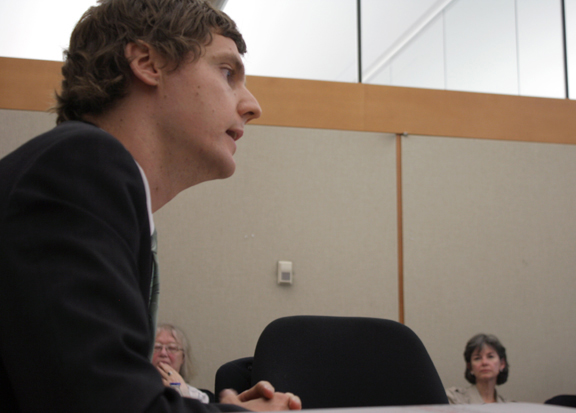
David Eby, executive director of the B.C. Civil Liberties Association addresses the Vancouver Public Library board at their meeting on Sept. 24. Eby told the board that the topic might make them squeamish, but allowing Exit International to hold a workshop on suicide at the central branch on Nov.3 isn't illegal. (Justin Langille photo)
He knows about the intimate details better than most people, and that’s why he isn’t going to lie about it.
“ If I had to characterize the relationship, I’d say it’s a very uncomfortable one,†Russel Ogden said about the common ground between suicide and education.
A professor in the department of sociology at Kwantlen Polytechnic University since 2006, Ogden’s academic research and lectures focus on euthanasia and assisted death.
His third-year course, Aspects of Dying and Death, and a fourth-year course, Sociolegal Aspects of Assisted Suicide, both invite students to examine the issues surrounding suicide and assisted death in society.
“We’re all very uncomfortable with these topics,†Ogden said with a deep sigh, “and I think that an education system needs to spend time with the uncomfortable topics. That’s how we get change. It’s only by addressing these uncomfortable topics that can we can improve and advance society. “
Recently, Ogden has had plenty of opportunity to discuss the complex moral and social issues.
On Sept. 22, Metro Vancouver reported that Paul Whitney, chief librarian of the Vancouver Public Library, had banned Exit International, an Australian suicide education and advocacy group, from holding public workshops at the library’s central branch in downtown Vancouver.
According to its website, Exit International is the leading voluntary euthanasia and end of life education and advocacy organization. Dr. Philip Nitschke, author of The Peaceful Pill, a guidebook on methods for ending life if elderly or terminally ill, heads the group.
Whitney told Metro that after police and legal experts informed him that holding the workshops in the library the workshops would violate the Criminal Code, he decided to bar the group’s presentations.
Facing media pressure, Whitney and the library board heard from B.C. Civil Liberties Association executive director David Eby at their board meeting Sept. 24.
Eby described the library board as an ally to the cause of free expression, but he reprimanded the board for their hesitation, reminding them of their duty.
“ Because there is significant public demand and significant need for it, and this is a discussion rather than a promotion or an encouragement, we would suggest that the library consider its obligation to the Charter of Free Expression and let this discussion go ahead,†Eby told the executives. “We don’t think that there is any coincidence that the library has in its mandate the mission towards intellectual freedom and the ability to discuss even controversial ideas.â€
On the following Monday, Sept. 28, Ogden had a letter to the editor published in the Vancouver Sun that echoed Eby’s opinion.
“Libraries and universities are built on values that promote education, freedom of thought and freedom of speech. When trusted institutions censor talk about suicide, not only do they undermine the core values on which they are built, they diminish our humanity,” he wrote.
Ogden insists that while assisted might be illegal in B.C., there is nothing illegal about Nitchke’s workshops and the advice that it offers to those considering end-of-life options. Furthermore, he said that the library already stocks books similar to literature that Exit International provides, and that providing a social opportunity for people to discuss suicide might change someone’s views.
“I think that they would be doing a much bigger service to people if they let them talk about it in a group,†said Ogden. “Because, if in that context, if you have someone who is anxious or perhaps suicidal, impulsively so, other people in the crowd will recognize that. They might say ‘Are you O.K? Do you want to talk? Feel like going for a coffee afterwards?’ They might make a friend. That might turn them around.â€
In the first part of his letter to the editor, Ogden made mention of another Canadian news item, one that hit closer to home for him than a dispute at his public library.
On Sept. 15, the CBC reported that 19-year-old student Michel Gariepy, a student at the University of Ottawa, had jumped to his death from the 15th floor balcony of his residence on the evening of Sept. 12. The news report noted that Gariepy was well liked by those who knew him and regarded as intelligent and “forward thinking.†Ogden’s daughter might have felt the same way, but she never got the chance to meet Gariepy, even though she is in her first year at Ottawa and she lives in the residence once inhabited by Gariepy.
“She’s just left home, she’s gone to Ottawa and she’s 17 years old,†Ogden said of his daughter’s situation, “ and some guy jumps from the 15th floor in her building. Welcome to university, right?â€
Frustrated, Ogden describes the events that followed as typical of a post-suicide crisis situation. Police and firefighter units came to assess the scene; the pavement was hosed down; a memorial is erected; and the victim is remembered, by some.
He said that most people, such as his daughter, didn’t know the victim or anything about the circumstances surrounding the death and have no safe place to voice their concern over what has happened or their thoughts about suicide, even in a post –secondary educational setting.
Ogden believes that this lack of opportunity for discussion at a time of crisis is a symptom of a greater ill. He thinks that if there was a more open attitude to discussing suicidal thoughts and mental illness, people would be less likely to reach the point of feeling to take their own live.
“If we really are troubled by suicide, the way that we should address that trouble is by making it a social issue that is worthy of discussion,†Ogden said.
“Suicide is something that is after-the-fact, but when people are contemplating it, we need to be more open to having that discussion. People often think about suicide, but they don’t engage in any self-harming or even suicide attempts, let alone actual suicide. We should be able to talk about how we have these thoughts in a safer place, where we can be confident that expressing these thoughts isn’t going to result in an intervention that is embarrassing, shameful and excessive.â€
Ogden said that the “professional” response to suicide deters people from talking about their suicidal thoughts. According Ogden, in the majority of cases, people are hospitalized, scrutinized and viewed as safety risks rather than people in sensitive states of mental health. Knowing this, people choose not to tell their loved ones or community supports.
Though he acknowledges that public education and community services can go a long way towards promoting awareness and discussion of suicide and mental health issues, Ogden thinks that the first step towards changing our attitudes is something simpler.
“It starts with some basic common sense…that is, if we see something that is upsetting us about someone’s behavior, we talk to them about it. That if we’re having difficult thoughts, our own thoughts about self-harm or suicide, that we can express it. You can create all the programs that you want, whether they be courses, institutions, suicide prevention, resources all of that. But really, my call would be…let’s use some common sense and be decent to one another.â€
Scholarship helps student concentrate on designing the end
September 29, 2009 by Justin Langille · Leave a Comment
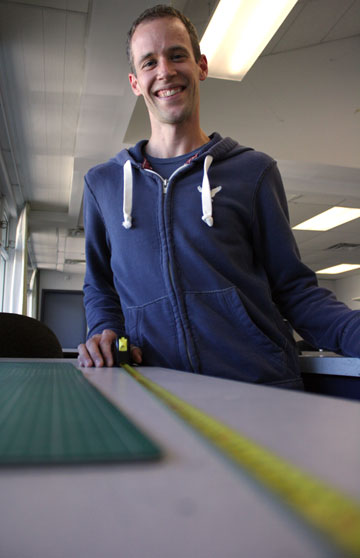 The award was generous.
The award was generous.
The recognition for his leadership and volunteering? Even more so.
However, Lucas Nightingale is most enthusiastic about what receiving a Millennium Excellence Award scholarship will do for Vancouver communities in the future.
“With one less thing to worry about, then you can focus on what you’re really in school to focus on, which is your work,†said Nightingale, “developing ideas and experimenting and trying something new.â€
A student in his third year of an Interior Design BA at Kwantlen’s Richmond campus, Nightingale was awarded the $10, 250 scholarship early in September in honor of his leadership on campus, ambitious involvement in Vancouver’s interior design industry and progressive volunteer work.
Since beginning at Kwantlen. Nightingale has co-founded the Emerging Green Builders Group, an organization that advocates for sustainable design practices. Additionally, he contributes to the Interior Design Association of B.C. as the Kwantlen student liaison. In the little spare time he has left, he has managed to find time to volunteer with the Friends for Life Society, an organization based out of Vancouver’s West End that provides social and personal services for people requiring palliative care, or support through the process of death.
While spending time with clients in sterile hospital rooms or impersonal nursing home settings, Nightingale witnessed the unnecessary suffering that people endure in a sensitive stage of life. He aid that these types of care environments are often detrimental to the healing or dying of a person dealing with a terminal illness.
With a holistic perspective on design and how it affects the spaces in our lives, Nightingale is formulating ideas on how dying can be made more natural and comfortable for people in their own homes.
“To die well is really important,†said Nightingale. “Most often, if you’re dying in your own home, that’s where people are most comfortable. If that option is open, nine times out of 10, people would choose their homes over a hospital, for sure. The practicality of it is that if they need medication or nursing support, how can interior design provide that?â€
Nightingale thinks that architects and designers need to consider the full life cycle when building or modifying homes, so that the spaces of a home will be accessible and pleasant for people in the early stages of life as well as old age. In his view, healthy living is important, but so is healthy dying, or “a good death”.
For now, Nightingale is busy with the school work that will help get his design ideas off the ground. This semester, he will be closely studying the relationship between end-of-life care and interior design. He hopes that this work will yield some bigger ideas for his fourth-year thesis and ultimately, change the way society experiences an inevitable part of life.
“For me, it’s about welfare and quality of life in those final days and a hospital setting just isn’t…I think that we can do better than that. It’s a huge topic and it’s not something that interior design can solve on it’s own, but it’s something that interiors are a part of.â€
Kwantlen grad offers discounts on a chance to laugh
September 23, 2009 by Justin Langille · Leave a Comment

Kwantlen PR program alumni Karin Lornsen hams it up at the Westin Grand Hotel on Robson Street in Vancouver, the headquarters for ComedyFest Vancouver during the festival. (Justin Langille photo)
Has the semester got you down? Need a laugh? A cheap, affordable laugh that is?
A Kwantlen alumnus working with ComedyFest Vancouver is offering current students discount tickets for the remainder of the festival.
Karin Lornsen, a 2007 graduate of the public relations diploma program, told The Chronicle that $9.95 tickets to a select set of performances at The Cultch theater (see details below) will be reserved for Kwantlen students. Interested students only have to show up to the theatre, located at the corner of Venebles and Victoria, with a valid Kwantlen student ID to receive discount admission to some of the most cutting-edge performances of the festival.
She also said that if students want tickets for other festival shows, they can be ordered from the Ticketmaster website for the same price.
After graduating from Kwantlen, Lornsen worked as a PR intern at Karyo Edelman Communications, one of Vancouver’s biggest PR and communications companies, but felt the constraints of working in a structured, “hands-off” environment. “It was a great experience and they had lots of major clients,†she said, “but I wasn’t allowed to do much.â€
Once her contract expired, her communications savvy earned her a position in radio promotions and social media with Destination Funny, the local promotion company that puts on Comedy Fest Vancouver every year.
Lornsen said that the job change has let her “get her hands dirty” and have some fun while she works.
“There is definitely a sense of humor around here. Our producer is a stand-up too, he headlines at Just For Laugh…we’re like a family around here, hanging out, opening bottles of beer. It’s crunch time now, but it’s been a great experience.â€
Lornsen may be out there enjoying the PR career that she wants, but she remembers what it was like to be a student and is happy to reach out and offer some entertainment to Kwantlen students.
“I was a student for 10 years, I definitely know how it is financially. I thought it would be a good opportunity for students to kick back before exams and have some fun.
• • •
Shows that are being offered at a discount are:
- Edge of the Fest with David Cross, hosted by George Stroumboulopoulos: Saturday, 8 p.m., The Vogue
- Comedy Death Ray : Thursday, 8 p.m., The Vogue
- Best of the Fest with Tom Arnold: Friday, 8 p.m., The Centre in Vancouver For Performing Arts
- Best of the Fest with Red Green: Saturday, 8 p.m., The Centre in Vancouver For Performing Arts
- SF Sketchfest: Friday and Saturday, 7 p.m., The Cultch Comedy Lab
- Picnicface & Friends: Thursday, Friday and Saturday, 9 p.m., The Cultch Comedy Lab
- Comedy Noir: Jesus Roast: Saturday, 9 p.m., The Cultch Historic Theatre
- Comedy Noir: Hitler Roast: Friday, 9 p.m., The Cultch Historic Theatre
- Comedy Noir: Obama Roast: Thursday, 9 p.m., The Cultch Historic Theatre
- Politics, Truth and Other Incompatibles: Thursday, 7 p.m., The Cultch Historic Theatre
- I’m Only a Little Racist: Friday, 7 p.m., The Cultch Historic Theatre
- OMG: Saturday, 7 p.m., The Cultch Historic Theatre


